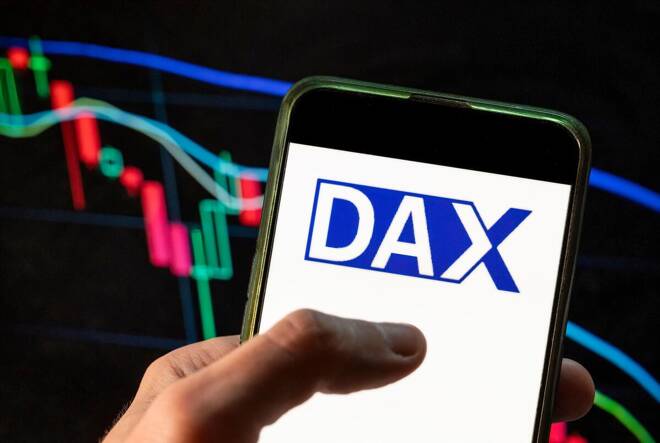Advertisement
Advertisement
DAX Index: The German Economy and ECB President Lagarde in Focus
By:
The DAX futures signal a positive open. However, German GDP numbers and ECB monetary policy comments will influence the appetite for DAX-listed stocks.
Highlights
- The DAX gained 0.95% on Friday, ending the session at 16,705.
- ECB commentary and US producer prices drove demand for DAX-listed stocks.
- On Monday, the focus will be on economic indicators for Germany and the Eurozone.
Overview of the DAX Performance on Friday
The DAX gained 0.95% on Friday. Reversing a 0.86% loss from Thursday, the DAX ended the session at 16,705.
ECB President Lagarde Raised Bets on ECB Rate Cuts
On Thursday, ECB President Lagarde raised bets on ECB rate cuts. The ECB President talked about inflation, reportedly saying,
“I think that rates, barring any further shocks or unexpected data, will not continue to go up. And if we win our fight against inflation, and if we are certain that inflation will indeed be at 2%, at that point rates will start to go down.”
There were no economic indicators from Germany to impact buyer demand for DAX-listed stocks on Friday.
However, supply disruption stemming from the Red Sea conflict and economic indicators from China influenced the DAX.
US Producer Prices and US Bank Earnings
On Friday, US producer prices supported rising bets on a Fed March rate cut. Producer prices fell by 0.1% in December, signaling a softer inflation outlook.
However, US banks delivered mixed earnings results testing the appetite for financial stocks.
On Friday, the Dow declined by 0.31%. However, the S&P 500 and Nasdaq Composite Index saw gains of 0.08% and 0.02%, respectively. 10-year US Treasury yields ended the session down 0.68% to 3.9415.
After the latest round of US inflation numbers, the CME FedWatch Tool had the probability of a March Fed rate cut at 76.9%, up from 64.0% on Friday, January 5.
The Friday Market Movers
News of Volvo Cars planning to pause output in its Belgium plant over concerns about the Red Sea situation left auto stocks in negative territory. Porsche slid by 2.56%, with BMW and Mercedes-Benz Group seeing losses of 1.64% and 1.38%, respectively. Volkswagen fell by1.11%.
Bank stocks had a mixed session as investors responded to US earnings results. Deutsche Bank slid by 1.23%, while Commerzbank gained 0.04%.
However, Airbus and Siemens Energy rallied 3.63% and 3.62%, respectively. Sentiment toward Boeing continued to support the appetite for Airbus stocks. The situation in the Red Sea continued to drive buyer demand for Rheinmetall AG, which gained 2.47%.
The German Economy and ECB President Lagarde in Focus
On Monday, the German economy will be in the spotlight. Wholesale prices and Q4 GDP numbers warrant investor attention.
A continued downward trend in wholesale prices would signal a weaker demand environment. However, declines in wholesale prices could ease consumer price inflation and support bets on an ECB rate cut. Economists forecast wholesale prices to fall by 0.3% in December after declining by 0.2% in November.
Significantly, economists expect the German economy to contract by 0.3% in Q4 after expanding by 1.9% in Q3. A more marked-than-expected contraction could impact buyer demand for DAX-listed stocks.
Beyond the numbers, ECB President Christine Lagarde is on the calendar to speak on Monday. Further comments supporting a more dovish ECB policy outlook could support the appetite for riskier assets.
Eurozone Trade and Industrial Production Numbers
Investors must also consider economic indicators for the Eurozone. Eurozone industrial production and trade data for November will garner investor interest. Member state reports suggest weaker industrial production but improving trade terms. A deviation from member state signals could impact the DAX.
Economists forecast the Eurozone trade surplus to widen from €11.1 billion to €12.5 billion. However, economists expect industrial production to fall by 0.3% after falling by 0.7% in October.
In the futures, the DAX was up 50 points. There are no US economic indicators for investors to consider on Monday. The US markets are closed for Martin Luther King Jr Day.
Short-Term Forecast
Near-term DAX trends will hinge on German GDP numbers, inflation-related data, and ECB commentary. Softer inflation indicators and ECB comments favoring a more dovish ECB rate path could support a DAX move toward 17,000. However, investors must consider geopolitics.
DAX Technical Indicators
Daily Chart
The DAX remained above the 50-day and 200-day EMAs, affirming bullish price signals.
A DAX move through the Thursday high of 16,840 would bring the all-time high (AHT) of 17,003 into view.
German economic indicators and ECB commentary are in focus.
However, a drop below the 16,500 handle would give the bears a run at the 16,470 support level.
The 14-day RSI reading of 58.28 indicates a DAX move to the 17,000 handle before entering overbought territory.
4-Hourly Chart
The DAX held above the 50-day and 200-day EMAs, confirming bullish price trends.
A DAX break above the Thursday high of 16,840 would support a move toward the ATH of 17,003.
However, a drop below the 16,600 handle would give the bears a run at the 16,470 support level.
The 54.11 14-4 hour RSI indicates a DAX return to 17,000 before entering overbought territory.
For a look at the economic events, check out our economic calendar.
About the Author
Bob Masonauthor
With over 28 years of experience in the financial industry, Bob has worked with various global rating agencies and multinational banks. Currently he is covering currencies, commodities, alternative asset classes and global equities, focusing mostly on European and Asian markets.
Advertisement
